Hegel, Freud and Fanon
Creolizing the Canon
Series editors: Jane Anna Gordon, Associate Professor of Political Science and Africana Studies, University of Connecticut and Neil Roberts, Associate Professor of Africana Studies and Faculty Affiliate in Political Science, Williams College
This series, published in partnership with the Caribbean Philosophical Association, revisits canonical theorists in the humanities and social sciences through the lens of creolization. It offers fresh readings of familiar figures and presents the case for the study of formerly excluded ones.
Creolizing Rousseau edited by Jane Anna Gordon and Neil Roberts
Hegel, Freud and Fanon Stefan Bird-Pollan
Published by Rowman & Littlefield International Ltd
Unit A, Whitacre Mews, 26-34 Stannary Street, London SE11 4AB
www.rowmaninternational.com
Rowman & Littlefield International Ltd.is an affiliate of Rowman & Littlefield
4501 Forbes Boulevard, Suite 200, Lanham, Maryland 20706, USA
With additional offices in Boulder, New York, Toronto (Canada), and Plymouth (UK)
www.rowman.com
Copyright 2015 by Stefan Bird-Pollan
All rights reserved . No part of this book may be reproduced in any form or by any electronic or mechanical means, including information storage and retrieval systems, without written permission from the publisher, except by a reviewer who may quote passages in a review.
British Library Cataloguing in Publication Data
A catalogue record for this book is available from the British Library
ISBN: HB 978-1-78348-300-6
PB 978-1-78348-301-3
Library of Congress Cataloging-in-Publication Data
Bird-Pollan, Stefan.
Hegel, Freud and Fanon : the dialectic of emancipation / Stefan Bird-Pollan.
pages cm.(Creolizing the canon)
Includes bibliographical references and index.
ISBN 978-1-78348-300-6 (cloth : alk. paper) ISBN 978-1-78348-301-3 (pbk. : alk. paper) ISBN 978-1-78348-302-0 (electronic) 1. Subjectivity. 2. Idealism. 3. Hegel, Georg Wilhelm Friedrich, 17701831. 4. Freud, Sigmund, 18561939. 5. Fanon, Frantz, 19251961. I. Title.
BD222.B57 2015
2014040651
126dc23
 The paper used in this publication meets the minimum requirements of American National Standard for Information SciencesPermanence of Paper for Printed Library Materials, ANSI/NISO Z39.48-1992.
The paper used in this publication meets the minimum requirements of American National Standard for Information SciencesPermanence of Paper for Printed Library Materials, ANSI/NISO Z39.48-1992.
Printed in the United States of America
To my parents
Abbreviations
This book jumps around quite a bit between source texts. This is particularly the case with Freud, from whose various works I am often forced to pull passages together to make my argument. Throughout, I indicate the name of the essay I am working with rather than simply citing the Standard Edition (SE) of his work. I also indicate where the German passages are to be found in the Studienausgabe (SA), which reprints Freuds German texts together with the critical apparatus taken from the Standard Edition.
I have employed the same citation strategy with regard to Hegel. As the Phenomenology of Spirit plays a central role in this study, I have cited it in text as PhG , also referring to the Gesammelte Werke as GW followed by volume and page number.
Fanons Black Skin, White Masks is cited as BW; The Wretched of the Earth is cited as WE.
Acknowledgments
This book, like most, I imagine, is an attempt to repay some of the intellectual debts that it has been my pleasure to incur over the past twenty years. While some debts will be obviousthere is nothing here that I claim has not in some way already been said by Kant, Hegel, Freud, and Fanonothers are less obvious, though no less significant for being so. The thinkers I am centrally concerned with here come with a certain manifest content, but it is really the latent content I am interested here. And so it is to the people who showed me the way to read this lineup that I owe a debt no less great than to the first four.
In graduate school I had the great fortune to study with Gregg Horowitz and Jay Bernstein, and it is their readings of Adorno, Freud, and Hegel that have marked my own thinking of the negative in the deepest way possible. Much of what I write is still a meditation on the things they were trying to express as clearly as they could, but which nonetheless remained enigmatic to me. While at Vanderbilt I benefited from countless hours of discussion with Jeff Jackson, Brad Rappaport, Daniel Ramos, and my incomparable wife, Jennifer. Jeff Jackson is still my closest philosophical interlocutor and there is nothing in this book that Ive not run past him countless times.
The book itself took less time to write than I expected and grew out of an article I conceived while teaching in social studies at Harvard. The group of scholars researching and teaching there were part of the reason I embarked on this project in the first place. Here, in particular, Id like to thank Scott Staring, Reidar Maliks, Thomas Poniah, Patti Leonard, Anya Bernstein, and Richard Tuck, who put Fanon on the syllabus.
While at Harvard I had the pleasure of getting to know Chris Korsgaard, whose work had already deeply influenced my reading of Kant. Though I was not officially her student, she welcomed me into her seminars and classes and Ive benefited greatly from conversations with her. Her influence is everywhere in my conception of the constructive side of this project.
My colleagues at the University of Kentucky have been supportive of my project and have, in several instances, read drafts. Ive benefited greatly from the feedback of Arnold Farr, Leon Sachs, and Michel Trask. Colleagues and friends who made me eager to work so that I might be done working include Tim Sundell, Renee and Darius Fatemi, Jeff Clymer, Brandy Anderson, Leon Sachs, Pearle James, Michael and Stephen Trask, Bob Sandmeyer, Nell Whitman, and Melissa Henke.
Along the way, Ive received valuable encouragement in all things Fanon from Lewis Gordon, Nick Nisbitt, and Nigel Gibson, the last of whom has been especially helpful in getting the manuscript into its final form. Jane Gordon and Neil Roberts stepped in at just the right moment to steer this project to a conclusion. Mari Ruti has in the past years become a good friend and I have benefited greatly from our conversations about the relationship between psychoanalysis, philosophy, and post-structuralist theory.
The intellectual debts I incurred early on have become so much part of myself that I cannot imagine myself without them. Into this category falls one of my oldest friends, Daru Huppert, with whom Ive been in continued conversation about Freud for almost twenty-five years. David Luft, with whom I took countless courses as an undergraduate, introduced me to texts and thinkers whom Ive spent the past twenty or so years trying to understand.
As even those before Freud recognized, one is most fundamentally shaped by ones family. My parents have unceasingly supported almost all of my endeavors and have made me the person I am. They set me on my path. My brother, Michael, has been a constant interlocutor and friend since we were young. My wife and intellectual companion, Jennifer, and my children, Anna and Lena, have framed my thinking at every turn. They give my life determinate content to keep moving.
Introduction
This book seeks to defend three theses in the theory of the subject. The first is that theories of pathology require a normal structure to become intelligible and vice versa; the second is that the relation between pathology and the normal structure is dialectical; and, the third is that the individual and the social cannot be understood without each other. The thinkers I examine in this study, Hegel, Freud, and Fanon, each endorse these theses, even if not exactly the way I have formulated them. While Hegel is chiefly interested in articulating a normal structurethat is, a theory of successful subject developmentFreud and Fanon are concerned with the pathologythat is, the truncation of certain strands of development. Each theorist, however, holds that the development of the subject occurs on the continuum between radical pathological disunity and successful unity. Moreover, each holds that the concrete position one occupies on this continuum determines the subjects future development.


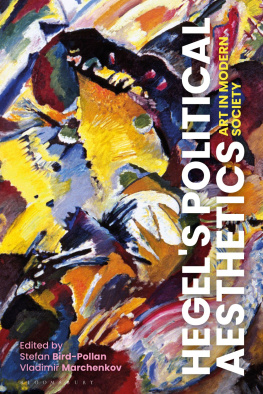
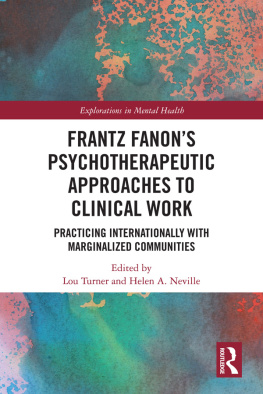
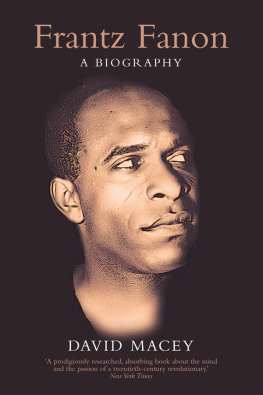
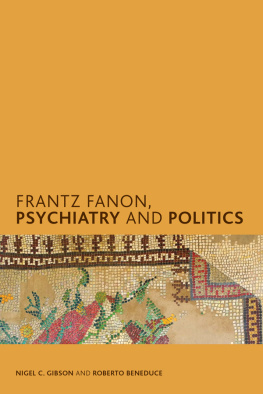
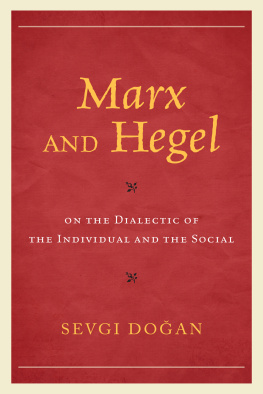
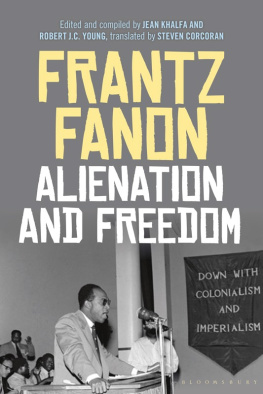
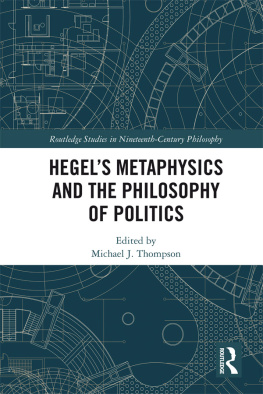
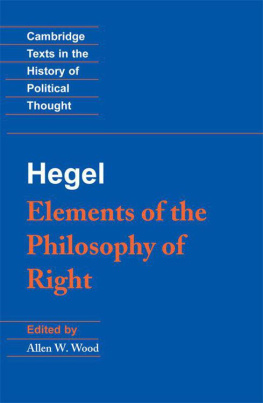
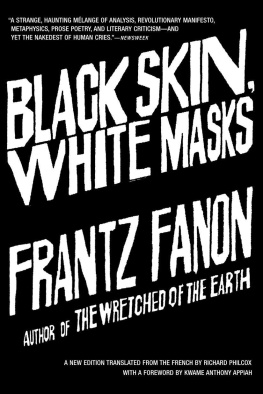

 The paper used in this publication meets the minimum requirements of American National Standard for Information SciencesPermanence of Paper for Printed Library Materials, ANSI/NISO Z39.48-1992.
The paper used in this publication meets the minimum requirements of American National Standard for Information SciencesPermanence of Paper for Printed Library Materials, ANSI/NISO Z39.48-1992.